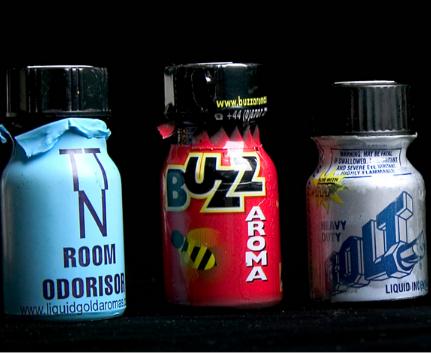Just a few weeks before many of Canada’s major Pride festivities, Health Canada has issued a warning asking retailers to stop selling and distributing alkyl nitrites or, as they are more commonly known on the party scene, the popular drug “poppers.”
“These products, labelled as leather cleaners and/or liquid incense, are known to be used by consumers to get ‘high’ and may pose serious risks to health if they are inhaled or swallowed,” the agency stated in a press release.
The ban targets a handful of specific brands, including Rochefort, Rush and Amsterdam Special, all of which are distributed by Lockerroom Marketing Ltd, a company that operates out of British Columbia.
Officials from the agency recently removed several products containing the chemical compound from an adult entertainment store in Calgary on June 5.
Alkyl nitrates – including amyl nitrates, butyl nitrite and isobutyl nitrite – is classified as a drug under the Food and Drug Act and requires an approval to be sold by Canadian businesses. Still, the compound has been available over the counter by niche retailers as a multipurpose product for years.
“Health Canada is not aware of credible evidence confirming that alkyl nitrites are legitimately used in consumer products such as leather cleaners, room odourizers or liquid incense,” the statement goes on to say.
“Health Canada’s view is that even though these products are labelled as consumer products, they are manufactured and sold so that users can ‘get a high.'”
While Lockerroom Marketing Ltd declined to comment on the ban or its product, a Toronto retailer, who spoke on condition of anonymity, confirmed that poppers continue to be a popular item at his store, with sales generally peaking on weekends and during Pride.
“The company line is that it is room deodorizer or a cleaner, but it is clearly being used for other things. And we have regular clients who buy it.”
First developed to treat angina in the mid-19th century, the drug rose to prominence during the 1970s disco party scene and has long been popular in the gay male community. Inhaled by users to enhance sexual pleasure, the drug dilates the coronary arteries and creates a sensation of lightheadedness but is also known to be dangerous to individuals with heart conditions, asthma or those who suffer from high blood pressure. In recent years, the drug has also made headlines because of its fatal interactions with medications that treat erectile dysfunction.
Health Canada has said it is working with the Canada Border Services Agency to prevent shipments of the drug from entering the country.


 Why you can trust Xtra
Why you can trust Xtra


